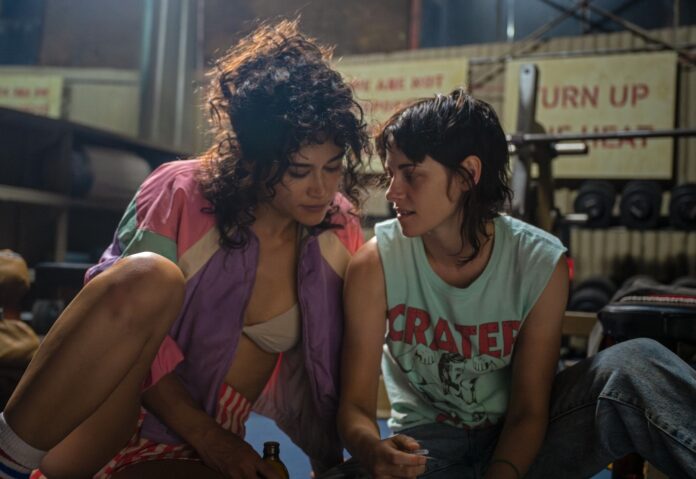Truly eccentric mainstream films are pretty rare—I’m surely not the only person still a little agog that something as lavishly weird as Poor Things got financed, then found a fairly wide audience, let alone earned much Oscar attention. Arriving hot on its heels is Love Lies Bleeding, which is equally bananas, although in very different ways. I went in with low expectations—some early reviews made it sound like an update of Bound with the straining-for-shock-value excess of 2021’s French Titane. But this second feature by Rose Glass has the mysterious inner equilibrium to go out on many an audacious limb and not fall off the tree.
Its too-muchness finally does become a little too much… but by that late point, you’ve had too good a time to grouse. While many other movies come fleeting to mind in comparison (from Stay Hungry to Thelma & Louise), the initial impact is a little like seeing Blood Simple for the first time 40 years ago: You leave the theater simultaneously thinking “What the hell was that?” and “Whatever it was, I liked it.”
Kristen Stewart at her twitchiest (though this time those mannerisms are played for laughs) is Lou, a bored denizen of a shit southwestern burg near the Mexican border. She works at a grungy gym where her surly attitude suits the general ambiance; you get the sense that nobody hereabouts is “nice.” She is estranged from her father (Ed Harris), who runs a shooting range and no doubt various much-less-legal endeavors, as suggested by the FBI agents sniffing around his territory.
The only reason she’s stuck around is to keep an eye on her sister Beth (Jena Malone), who unfortunately is devotedly married to the biggest, most abusive asshole (Dave Franco as JJ) in a town where such macho mouth-breathers are the norm. The best our mullet-haired heroine can do in terms of romance here is fend off the overtures of one Daisy, played with awesomely off-putting ditziness by Anna Baryshnikov. No wonder Lou is single.
Things suddenly look up with the appearance of Jackie (Katy O’Brien), who’s drifted in from an Oklahoma past she won’t revisit, headed towards a bodybuilding tournament in Vegas. This pit stop is to accrue some cash (she gets a job at the shooting range’s saloon—hey, what goes together better than guns and alcohol?) and to finesse her training.
Bug-eyed at this bulging newcomer, Lou offers her a place to stay, and some of the steroids that circulate surreptitiously at the gym. It’s love, and/or lust, at first sight. But chemical injectables turn out to have an exaggerated effect on Jackie, who maybe wasn’t so stable to begin with. When JJ’s latest bout of domestic violence puts Beth in the hospital, enraging Lou, it’s Jackie who takes vengeful action. We are not sorry for his fate. Still, this commences a domino-effect series of crises in which life, limb, sanity, and bodybuilding trophies all become escalatingly imperiled.
Its vaguely ’80s setting mostly defined by the ironic quote-marks of cheesy synthpop and day-glo lycra, this desert noir plays its very full deck of conceptual cards—half of them jokers—every which way, and gets away with it. Or at least it does until a leap into pure fantasy that kinda tears the complicated tonal fabric woven up to that point, in which Lou’s roided-up delusions and Lou’s flustered reality cohabit in a surprisingly viable space of sexy, bloody, crime-y black comedy. That misjudgment can’t quite derail a movie that’s successfully taken us too far already to blow it on one false step—we are in a forgiving mood.
Stuffed to the gills with ideas, Love Lies Bleeding (which opens in theaters this Fri/15) does not, oddly, make room for either the Wordsworth poem or the Elton John song that title might bring to mind. But to say it’s like Thelma & Louise meets Stay Hungry as written by a lesbian Jim Thompson is really an understatement—it is that crispy, and then some.
Another Sapphic amour fou drives Silver Haze, though rather than cartoonish grand guignol, here we’re in the realm of English kitchen-sink realism a la Ken Loach, Mike Leigh, and Andrea Arnold. Franky (Vicky Knight) is a nurse who’s the steadiest character in her loudmouthed, chaotic East London family—which isn’t saying much. Even she’s got a huge chip on her shoulder, as a consequence of scars left by a fire in childhood. (This plot element reflects actor Knight’s own experience, as did her prior collaboration with writer-director Sacha Polak, 2019’s Dirty God.) Having just broken up with a useless boyfriend, Franky is surprised to find herself swept into an intense relationship with Florence (Esme Creed-Miles), a young woman who briefly lands on her ward after a suicide attempt.
This liaison is even more surprising to Franky’s relatives, whose dysfunctionality does nothing to curb their reflexive homophobia. The newly minted lovers flee to Florence’s home in the dingy resort town of Southend-on-Sea, where she’s been raised by a now-ailing grandmother (Angela Bruce) alongside an autistic brother (Archie Brigden). These people, too, have problems. But they are an oasis of unconditional love and acceptance by the standards Franky has endured to date. The unexpected element that upsets this comparative paradise comes from Flo, whose own psychological damage had simply been in abeyance—a temporary calm between mental-health storms.
Though it’s sometimes hard to decipher the heavy working-class accents, Silver Haze is a drama both raw and artful. It needs to be both, because otherwise the sheer weight of so many woes in Polak’s script (alcoholism, unplanned pregnancy, religious fanaticism, et al.) might topple narrative credibility. But the powerful performances and understatedly forceful direction make the film’s laden agenda play out poignantly, rather than as some kind of miserabilist Olympics. It released to On Demand platforms last Tuesday 12.
Love is also complicated for the protagonists in The Breaking Ice, the latest from Singaporean writer-director Anthony Chen (Ilo Ilo, Drift). It’s set in Yanji, a city in China’s Jilin Province whose proximity to North Korea is underlined by the population’s ethnic mix, plus a fetishy propensity toward packaging Korean cultural stereotypes for tourist consumption.
Visiting from Henan for a former schoolmate’s wedding, young white-collar worker Haofeng (Liu Haoran) is ill at ease here—but then one gets the feeling he’s like that everywhere. His shy attentions are initially rebuffed by tour guide Nana (Zhou Dongyu). Later she asks him to hang out, however, along with another suitor, the unpretentious local Han Xiao (Qu Chuxiao). They all get very drunk, and somehow an alliance is born. It’s one that feels less like a romantic triangle (though it is, vaguely, that) than the kind of friendship in which people who are variously empty inside discover they complete one another.
Set in a wintry landscape of outings to ice mazes and snowy mountains, this is a charming and bittersweet tale whose characters gradually reveal some of the issues that led them here. But not all—Chen is less interested in problem-solving than creating a vibe. While it doesn’t all work (a “magical” wildlife encounter in particular felt too fey for my blood), this empathetic tale really does capture the enchantment of being young and finding your tribe. None of these figures might seem very special if a whole film was build around them, yet together they form a whole greater than their individual selves. Strand Releasing opens this quietly ingratiating feature at the Roxie on Fri/15.

Also greatly invested in probing the complexities of human connectivity is a prolific Bay Area filmmaker whose shorts over the last four decades have uniquely expanded the intersections between personal essay, found-footage, experimental and documentary cinema. This Sat/16 at the Roxie, How the Light Gets In: The Films of Jay Rosenblatt offers a sampling of his works along with an onstage discussion between the director and critic-scholar Bill Nichols.
Not included in the program: either of his recent Oscar-nominated titles, When We Were Bullies or How Do You Measure a Year? Nonetheless, plenty of awards have been collected by what you’ll get: 2005’s half-hour Phantom Limb, a meditation on mortality spurred by the death of Rosenblatt’s younger brother in childhood; 2000’s King of the Jews, about a queasy lifelong relationship towards the late Mr. J.C. of Nazareth; and 2017’s lovely nostalgic compendiumThe Kodachrome Elegies. On a lighter note, there’s 2008’s Beginning Filmmaking, in which passing the titular intel on to a 4-year-old daughter turns out to be very much like herding cats. More info on the 4 pm show can be found here.





